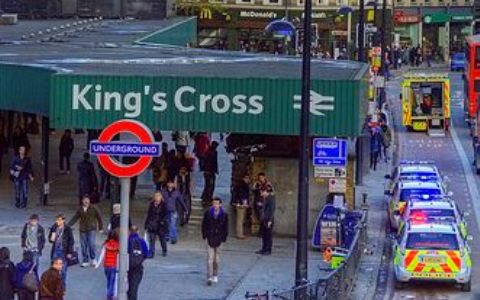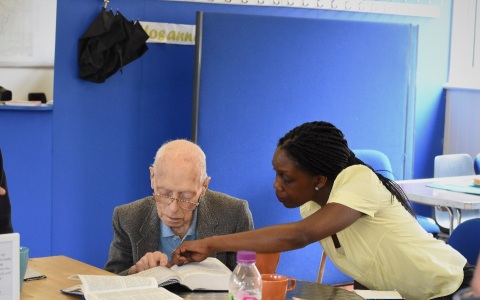Government is 'selling off Sundays' says angry London mission chief.
by - 8th June 2016

GOVERNMENT legislators are closing down Sundays for financial gain, says a London mission leader.
As the nation’s Muslims begin Ramadan, and the Mayor of London Sadiq Khan announces his intention to fast and thereby ‘build bridges of understanding’, London City Mission’s boss Graham Miller has hit out at the government for forcing people out of church.
‘The government are just following on a social trend saying we’re moving towards a 24-7 society, that Sunday is an anachronism that needs to be cleared up.
‘They are selling off Sundays for financial benefit.'
Christians across Britain were finding work increasingly encroaching on Sunday, claims the head of an organization that speaks up for the poorest sections of the nation's capital.
Some find it hard to explain to employers the importance of Sunday and ask for time off, he says.
Others think telling bosses they cannot work on a Sunday would be problematic, making them appear uncooperative and old-fashioned, especially in cover letters.
 Miller believes the push to 'de-sacralise Sunday' is coming from legislators, with government policy on proposed Sunday trading laws and the 7-day NHS ‘following society’s mood without considering its impact’.
Miller believes the push to 'de-sacralise Sunday' is coming from legislators, with government policy on proposed Sunday trading laws and the 7-day NHS ‘following society’s mood without considering its impact’.
‘De-sacralising Sunday harms the whole of society, especially in poorer areas.
‘We underestimate the wonderful impact churches have in our communities.
‘We talk about having a big society and churches being part of that, but then we take an axe to the tree and make life more difficult for those very churches,’ he said in an interview with Lapido Media.
Missing
Normalising work on Sunday is also hitting young believers.
 The current Youth Moderator for the United Reform Church, Sandy Nunn, described his experience obtaining a position as a retail supervisor on the Isle of Wight.
The current Youth Moderator for the United Reform Church, Sandy Nunn, described his experience obtaining a position as a retail supervisor on the Isle of Wight.
‘It was a Sunday job but there was such a pressure to take it, so that was it, it was the only option to me. It was kind of all or nothing and I needed an income to survive.’
‘It was an easy decision in that it was that – or not have a job.’
Nunn said that to make up for missing a Sunday service he attends regular midweek services but he admitted that not going to a Sunday service left a hole in his religious life.
‘The service I attend during the week fills the gap, but a lot happens on a Sunday you can quite easily miss, even with stuff like midweek fellowships.’
Jessica Harpur moved to London from Northern Ireland several years ago and said she felt modern working culture often did not account for Christians needs.
‘Adverts that say “must be able to work Saturday and Sunday”, make me feel like I am not a flexible worker.
‘I look at it and think, well I cannot apply for it then.’
Another former Youth Moderator who now works in the civil service, Andrew Weston, remembered working shifts and said being forced to choose between church and work was a growing problem.
‘I think it is one of those things that affects lots of people but we don’t talk about it much.
‘Some people say “Well, if you are going to be put in that position, choosing between work or church, you don’t take that job.”’

The London City Mission started life 180 years ago in the slums and tenements of industrialising Britain. The same pressures are returning to haunt the hidden corners of the capital .
The increasing need to choose between work and faith is once again hitting the poorest most, said Miller.
‘When I go to prayer meetings with church leaders who are in council estates: they say ”so-and-so has become a Christian and they are finding it really difficult to get to church at the moment because they are expected to work on a Sunday and it’s hard for them to move their shifts round.” Otherwise they don’t get to see their wife or they won’t see their kids.
‘For people on the minimum wage it’s actually much harder, because people are desperate for jobs and when they are going in for an interview they want to be flexible.’
Peter Law, pastor at West Kilburn church in Queens Park, north-west London, echoed Miller’s comments and said that the jobs pressure was most often felt by young people.
‘Many young people are just dropping out of church. Not because of a lack of faith or belief but just because of pressure of jobs.’
Change
This pressure on Sunday morning has led to many churches holding more services and prayer meetings in the rest of the week in the hope of finding a time more suitable for busy young professionals.
Ian McClaren, a URC minister at a network of south London churches, experimented running prayer meetings on weekday evenings.
He said that a move away from Sunday was logical.
‘One of the great traps to fall into is to imagine everything must happen in church on a Sunday morning.
‘I think that we need to accept that some things have changed and rearrange church life around peoples’ new working patterns.
‘These days you can’t expect people to come on a Sunday morning at eleven o'clock.’
